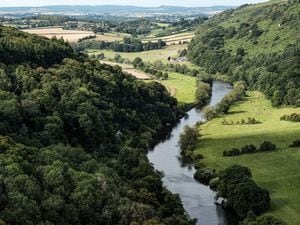Judicial review of Environment Agency's 'failure' to protect River Wye from pollution granted
Campaigners from River Action have been granted permission for judicial review of the Environment Agency’s alleged failure to protect the River Wye from pollution.

The High Court will examine the EA’s enforcement of regulations that govern the amount of organic manure and artificial fertiliser that can be spread on agricultural land from which water runs off and leaches into the River Wye.
Permission for judicial review was granted following a hearing at the High Court in Cardiff on Thursday. The judicial review hearing is expected to take place during 2024.
River Action’s chairman and founder Charles Watson said: “We are delighted that we have now finally been granted permission to go to court, where we will vigorously make the case that a prime cause for the recent ecological collapse of the River Wye is the EA’s decision to slavishly follow DEFRA’s guidance to not enforce critical provisions of the 2018 Farming Rules for Water.
"These critically important regulations state that fertilisers and manures must not be spread on soils already over-saturated with excess nutrients.
"Tragically, due to the uncontrolled growth of what we believe to be the largest concentration of intensive poultry production in Europe, this is exactly what has been allowed to happen, with the horrific environmental consequences for the River Wye being all too plain to see.”
River Action formed in 2021 for the purpose of raising awareness of river pollution in the UK and has since led a number of high profile campaigns, with key members including Feargal Sharkey.
It works to apply pressure on industrial and agricultural producers and water companies to take more responsibility to remedy the adverse environmental impact their supply chains have on the health of the country's rivers.
It is argued that the Wye is heavily polluted because excessive amounts of animal manure are regularly spread across land within the river catchment, leading to a substantial increase in levels of phosphorus in the soil.
This then runs off and leaches into the river, causing widespread algal blooms along the length of the river system, turning the water an opaque green.
Algal blooms block sunlight, remove oxygen and cause widespread algal deposits across the riverbed, with severe consequences for the vegetation and wildlife of the river.
The Wye was designated a Special Area of Conservation (SAC) to protect the river’s once-famous extensive Ranunculus river weed beds.
However, according to River Action, more than 90 per cent of the river’s Ranunculus have now been lost, smothered by algal blooms.
River Action says this could have been seriously mitigated had the EA enforced existing environmental regulations.
The environment campaign group was given permission to argue its case on all three of its grounds:
The Environment Agency has adopted an approach to enforcing the Farming Rules for Water (FRfW) that ultimately frustrates the purpose of the legislation it is supposed to enforce
By following guidance issued by the Environment Secretary, the Environment Agency has put itself in a situation where it is acting unlawfully
The Environment Agency has breached regulation 9(3) of The Conservation of Habitats and Species Regulations 2017 in that its policy on enforcement of the FRfW unlawfully fails to follow the requirements of the Habitats Directive
An Environment Agency spokesperson said: “The River Wye is a beautiful and important part of our landscape, our resources and community wellbeing.
"We are working with our partners to find solutions to tackle phosphate levels in the catchment by stepping up our farm visits to improve compliance and reduce pollution, enhancing monitoring at high-risk locations, and carrying out a detailed investigation into the management of poultry manure across the catchment.
“Moreover, the Environment Secretary recently held a roundtable with the Environment Agency, Natural England, local farmers, environment groups and others to discuss ongoing and future actions to restore the River Wye.”





